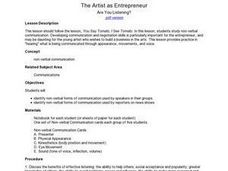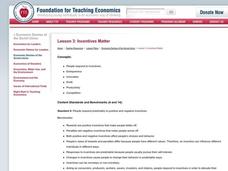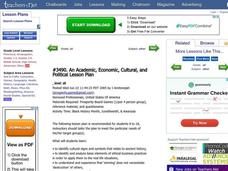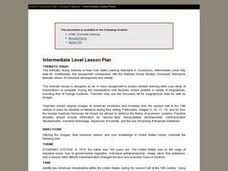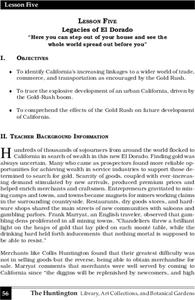Curated OER
The Artist as Entrepreneur: Are You Listening?
Pupils study non-verbal communication through appearance, movements and voice. They evaluate the non-verbal communication of television reporters and then participate in role-play scenarios using non-verbal communication.
Curated OER
Raising the Bar on How Business Gets Done
Students explore the concept of energy bar sales. In this energy bar sales lesson, students read an article about the sales of energy bars. Students discuss what is meant by red roads and white roads in the article. Students search a...
Curated OER
Google Foundation May Invest in For-Profit Firms
Students explore the concept of philanthropy. In this philanthropy lesson, students read an article about Google and its philanthropic endeavors. Students discuss companies that they believe would benefit from a charitable investment...
Curated OER
Growing Money
Young scholars establish a garden business. In this building a business lesson plan, students investigate how to create and build a business. Young scholars build a business of selling plants and become entrepreneurs.
Curated OER
Downing's Oyster House: Building New York
Fourth graders explore African American contributions to New York City. In this antebellum New York lesson, 4th graders research the accomplishments of Thomas Downing. Students explore primary and secondary sources about Downing's oyster...
Curated OER
Incentives Matter
Students identify what motive people. They will learn about both positive, and negative incentives. They will use this knowledge to make predictions about how people will behave. They will apply this knowledge to economics.
Curated OER
Hey, Mom! What's for Breakfast?
Students examine how he world eats breakfast. In this food choices lesson, students work in groups to list breakfast foods and their ingredients and find goods and consumers on the list. The, students use the Internet to complete a...
Curated OER
Explanations for Crime
In this Explanations for Crime worksheet, students answer questions in extended response form about crime and the theories behind it.
Curated OER
A FREE MARKET WITH THE HELP OF GOVERNMENT
Students engage in a study that explains how laws and government have policies that affect the economy to run more smoothly. The focus is upon the historical development of the free market and how the government was involved. Students...
Curated OER
Ford's Revolution (Differentiated by Ability)
Students explore the effects of Ford's use of the assembly line, auto financing, and increased wages to make his fortune. They complete a worksheet using the internet.
Curated OER
Market Structures and Competition
Students review concepts related to market structures and competition. Using supply and demand, they identify what factors cause them to shift and analyze business downward facing demand curves. They compare and contrast the abilities of...
Curated OER
Factors of Production
Students identify and define the four factors of production on a diagram. Using a product they use everyday, they write down which natural resources are used to make the product and what type of skills the workers needed to make it. In...
Curated OER
Planning: To Get Enough Money for Food
Students investigate methods that families use for planning meals and budgeting for them. In this nutrition activity, students complete activities that require them to determine how much it costs to feed children at different ages....
Curated OER
Tread Lightly: Where We Stand
Students explore the concept of ecological footprints. For this environmental stewardship lesson, students calculate their ecological footprints and consider how to reduce them.
Curated OER
An Academic, Economic, Cultural, and Political Lesson Plan
Students reflect on how many board games they've played have African Americans, their culture or history incorporated within. They identify four street games and three card games that appeal to African Americans. They play the...
Curated OER
Starting a Revolution
Students examine state quarters with images that refer to the Industrial Revolution. They discuss whether or not it is appropriate to commemorate that event. They research the Slater Mill and decide if it should be commemorated.
Curated OER
Using Charts and Graphs to Study East Asia's Modern Economy
Learners examine East Asia's modern economy. In groups, classmates use the internet to compare the resources, products, and economy of specified countries. After collecting the data, pupils create charts, tables and graphs. They...
Curated OER
Production: Specialization and Division of Labor
Third graders select a product to produce. In teams, pupils participate in hands-on activities to explore the concept of specialization. They discover the differences between a division of labor and independent production. Classmates...
Curated OER
CHAIN OF EVENTS
Students, exercising knowledge, reasoning and communication complete a chart that is well-organized and well-detailed. They assess the Economic concepts of supply and demand and how that relates to production and sales. In addition, an...
Curated OER
ECONOMIC SYSTEM
Students identify two American industrialists within the United States during the second half of the 19th century. They use specific examples, compare and contrast how these two industrialists were successful in their market. Students...
Curated OER
Imperialism
In this U.S. history worksheet, students read assigned textbook pages regarding Imperialism and respond to 45 short answer questions.
Curated OER
Introduction to Economics
Students discover the basic economic problem: scarcity; examine how "there is no such thing as a free lunch" (opportunity costs); and define economics. They act out a play demonstrating basic economic principles.
Curated OER
The Gold Rush: Guided Writing and Publication
Students read about the Alaska Gold Rush, its characters and the impact on the history of Alaska. They write a response as if they are a Klondike Stampeder in the late 1900s.
Curated OER
Legacies of El Dorado
Students explore the development of urban California as it was driven by the Gold Rush boom. They study historical documents and participate in a variety of hands-on activities designed to reinforce the concept of the instructional...


